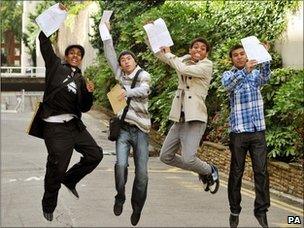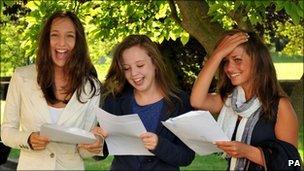Rise in top grades boosts GCSE record
- Published

More than half a million pupils are getting results
Pupils have achieved another GCSE record, with almost seven out of 10 entries (69.1%) being awarded a C grade or above.
Results published on Thursday show 22.6% of exams sat in England, Wales and Northern Ireland were awarded an A* or an A, up from 21.6% last year.
More pupils took single sciences, but some languages continued to decline.
There has also been a big rise in the number of pupils sitting English and maths GCSEs a year early.
More than one in 10 pupils sits maths at age 15 or younger - up 37% on last year - and just under a tenth sit English early, up by 50% on 2009.
It comes after the previous Labour government scrapped national tests at age 14 or Key Stage 3.
This has allowed to some schools and pupils to move on to GCSEs in these subjects a year early, with many going on to sit AS levels (the first part of A-levels) a year early too.
But the new trend will fuel the argument over whether GCSEs are getting easier.
And it may be reflected in the fact that overall, the proportion of entries getting A*-C grades is up again, by two percentage points on last year from 67.1% to 69.1% - the highest ever.
The pass rate rose for the 23rd year in a row, this year to 98.7% of entries.
'Disarray'
Around the nations, pupils in Northern Ireland did best with 76.3% of entries gaining an A* to C, up from 75.1% last year.
In England 69% of entries netted A* to C grades, up from 66.9%. In Wales 66.4% of entries were awarded an A* to C, up from 65.%% in 2009.
Across the subjects there have been huge rises in the numbers of science GCSEs sat, but further falls in some modern languages.
In individual science GCSEs, biology entries are up 28.3%, chemistry up 32.2% and physics up by 32.1%.
But attainment dropped slightly in all three sciences at A* and A grades, although a higher percentage up pupils scored A* - C passes.
Entries in French and German are down by 5.9% and 4.5% respectively.
Students from Cranbourne College nervously opened their results live on BBC Breakfast
This decline in modern languages continues a trend since the previous government decided the subject would no longer be compulsory at the age of 14.
However, French is still the most popular choice of languages with 177,618 students taking the exam this year.
But there are big rises in the number of pupils taking Portuguese, Chinese and Polish.
Andrew Hall, chief executive of the AQA exam board, said it was "a great day for science but a sad day for languages".
Boys continued to lag behind girls in most subjects, a trend of more than two decades, with the gap widening slightly between the genders at the top grades this year.
But boys maintained the edge they gained at A* and A in maths, and A in physics, last year and held their lead in economics and additional maths.
Schools Minister Nick Gibb congratulated pupils, but said "more needs to be done to close the attainment gap between those from the poorest and wealthiest backgrounds".
The results come amid increased competition for college places and in the jobs market, as well as warnings about grade inflation.
The Association of Teachers and Lecturers warned that the exam system was in "disarray" and that even those who achieved "a string of A*s" were not well served by GCSEs.
GCSE grades have risen almost continually since the first results for the exams in 1988.
Professor Alan Smithers, an education expert at Buckingham University, said exam questions had become very predictable and that there was competition between exam boards to improve the pass rates.
Also, he said, state schools were under pressure to maximise passes for league tables and so tend to enter pupils for subjects in which they are likely to get good grades.
Schools Minister Nick Gibb insists the GCSE exams have not become easier
But chief executive of exams regulator Ofqual, Isabel Nisbet, said the GCSE was "a well-respected qualification recognised by employers and educational institutions".
"Candidates, employers, schools and colleges can have confidence that these results are a fair record of the students' achievements and abilities," she added.
Domino effect
Shadow Education Secretary Ed Balls said claims that exams had got easier were "complete and utter nonsense" and said students were working harder and being better taught than in the past.
The NASUWT teaching union said despite pupils scoring the best ever results, they faced the worst ever outcomes because of the government's austerity measures.
General secretary Chris Keates said: "The coalition government must guarantee that all 16-18 year olds are guaranteed a place in education or training. This is the only way to avoid another lost generation of young people."
Mr Gibb also said anyone who had achieved their GCSEs would have a place at sixth form or college.
This was because the coalition government was continuing, for this year, the previous government's policy of guaranteeing young people a place in education or training at 16.

More than half a million pupils are getting their results
The University and College Union warned of a qualifications "domino effect" from this year's unprecedented pressure on university places.
GCSE students were "most likely to be pushed out" as they tried to compete with students with A-levels for spaces on further education college courses, it warned.
Students aged 15 and 16 in Scotland take standard grade exams, and received their results in early August. The pass rate was similar to the previous year.